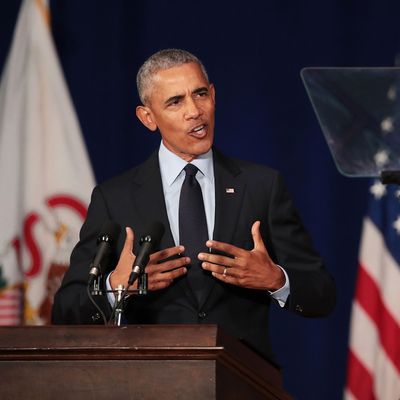
Republicans, and many naïve journalists, liked to attribute the hysterical right-wing backlash against Barack Obama to a sudden upsurge in fiscal conservatism. All these terrified tea party activists, and the Republican leaders warning of profound social transformation, were really just concerned about the budget deficit.
From this profound analytical error has followed a second one: that Donald Trump represents a sudden departure from the Republican Party’s character. After all, if you think Republicans were mainly reacting to excessive debt rather than engaging in a racialized backlash, then the emergence of Trump as the party’s standard-bearer after four years of putatively serious fiscal conservatism is a sharp change.
The most interesting argument in Obama’s speech in Illinois today was that both these conclusions are wrong. “It did not start with Donald Trump,” said the former president. “He is a symptom, not the cause. He is just capitalizing on resentments that politicians have been fanning for years.”
To be sure, Trump is an extreme and unusual manifestation of the Republican Party’s extremism. If Jeb Bush currently occupied the White House, the president would not be publicly ordering his attorney general to rough up the opposing party or equivocating about the merits of Nazis.
Still, as Obama pointed out, it is this Congress that has “systematically attacked voting rights to make it harder for young people and minorities and the poor to vote,” and which “embraced wild conspiracy theories, like those surrounding Benghazi, or my birth certificate, rejected science, rejected facts on things like climate change, embraced a rising absolutism, from a willingness to default on America’s debt by not paying our bills, to a refusal to even meet, much less consider, a qualified nominee for the Supreme Court.” Trump’s demagoguery, anti-intellectualism, paranoia, and willingness to flout democratic norms all spring from fertile soil watered by decades of right-wing extremism.
The Republican Party’s refusal to compromise with Obama on health care, climate, deficit reduction, and so on was not because Obama treated them too arrogantly or refused to address the deficit seriously. As Obama noted, the supposed fiscal conservatism that Republicans cited as the reason they couldn’t compromise disappeared overnight when they took power: “This is supposed to be the party of fiscal conservatism. Suddenly, deficits don’t matter, even though just two years ago, when the deficit was lower, they said, ‘I couldn’t help working families or seniors because it was, the deficit was, in existential crisis.”
In reality, as he noted, it was fundamentally an expression of social revanchism. As he told the young audience of students, “even though your generation is the most diverse in history, with a greater acceptance and celebration of our differences than ever before, those are the kinds of conditions that are ripe for exploitation by politicians who have no compunction and no shame about tapping into America’s dark history of racial and ethnic and religious division.”
Much of the debate about the meaning of Trump has revolved around the meaning of “normal.” When most Republican elites who are skeptical of Trump use the word “normal,” they have in mind the policy agenda supported by Paul Ryan and Mitch McConnell. Obama’s point is that this, while less abnormal than Trump’s deranged-emperor routine, is not normal, either.
“It’s not conservative. It sure isn’t normal. It’s radical,” said Obama. Again, he didn’t say this about a description of Trump’s peculiar ravings. He said it immediately after a description of the Republican Party’s party-wide agenda of making voting more difficult for marginalized constituencies, rejecting science, or encouraging the Benghazi-birtherism mania that flourished under his watch. Obama’s speech castigated Trump as the product of a party that long ago went mad.






























